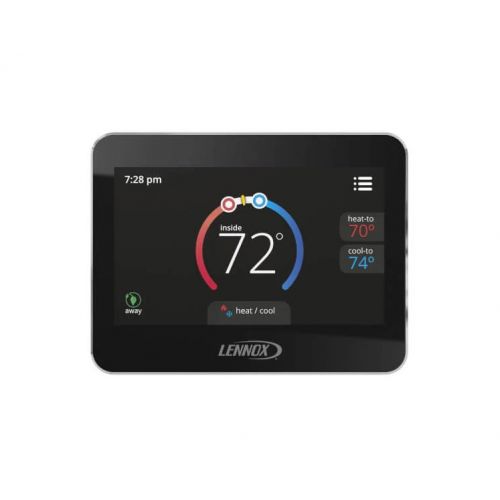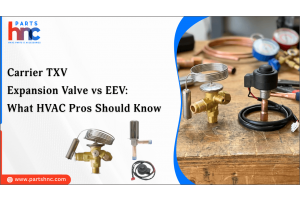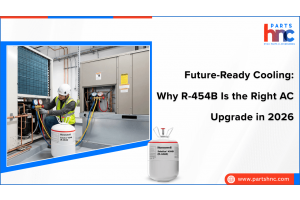Why Air-to-Water Inverter Scroll Heat Pumps Are Key to Green Buildings in 2026
As the construction industry accelerates toward net-zero goals, energy-efficient HVAC systems are becoming essential to sustainable building design. Air-to-water inverter scroll heat pumps are emerging as a leading solution in 2026, offering a reliable way to reduce carbon emissions while meeting modern comfort demands. Their ability to provide both heating and cooling with high efficiency makes them ideal for residential, commercial, and mixed-use green buildings.
These advanced heat pumps use inverter-driven scroll compressors to precisely match energy output with real-time demand. This results in lower energy consumption, reduced operating costs, and seamless integration with renewable energy sources such as solar and smart grids, supporting long-term sustainability goals.
What Is an Air-to-Water Inverter Scroll Heat Pump?
An air-to-water inverter scroll heat pump is a next-generation heating and cooling system that captures thermal energy from outdoor air and transfers it to water for indoor applications. This heated or cooled water can then be used for:
-
Space heating (underfloor heating, radiators, fan coils)
-
Space cooling (radiant cooling, air handling units)
-
Domestic hot water production
-
Commercial and industrial hydronic systems
Key Components
-
Air-source heat exchanger extracts low-grade heat from ambient air, even in cold climates
-
Inverter-driven scroll compressor continuously modulates capacity for precise energy use and stable temperatures, a hallmark of air-to-water inverter heat pump systems
-
Water-side heat exchanger efficiently transfers thermal energy to water for circulation
-
Smart control and integration system leverages smart inverter heat pump technology to work with solar panels, thermal storage, and building management systems for optimized performance
Air-to-water heat pumps using inverter scroll technology are highly efficient, utilize renewable energy, and integrate seamlessly with smart building systems. This makes them a key solution for low-carbon buildings in 2026.
How Inverter Scroll Technology Improves Heat Pump Efficiency
Inverter Scroll Technology enhances heat pump energy efficiency by continuously adjusting compressor speed to match real-time heating and cooling demands. This reduces energy use and improves indoor comfort.
-
Continuous Capacity Modulation: The compressor adjusts speed to match demand, reducing energy use and enabling energy-efficient heat pump systems.
-
Higher Seasonal Efficiency (SCOP & SEER): Running mostly at partial load allows heat pumps to achieve higher SCOP and SEER, improving energy ratings for green buildings.
-
Stable Comfort and Lower Noise: Smooth modulation maintains stable indoor temperatures, reduces operational noise, and enhances occupant comfort.
-
Precise Capacity Control: Inverter scroll compressors avoid energy waste by continuously adjusting output rather than cycling on and off like traditional systems, boosting overall heat pump energy efficiency.
-
Improved Partial-Load Efficiency: The system maintains high efficiency even at lower loads, ensuring optimal performance under varying building demands.
-
Longer Equipment Lifespan: Reduced mechanical stress and smoother operation minimize wear, lowering maintenance needs and extending system durability.
-
Integration With Smart Systems: Inverter scroll technology integrates with building management systems and renewable energy sources to optimize performance and sustainability.
This technology makes heat pumps highly efficient, reliable, and essential for sustainable, low-carbon, future-ready buildings.
Why Air-to-Water Heat Pumps Are Essential for Green Buildings
Green buildings focus on energy efficiency, low carbon emissions, and occupant comfort. An air-to-water heat pump for green buildings provides efficient, low-carbon heating and cooling, making it a cornerstone of sustainable HVAC systems.
Decarbonization of Heating
Heating contributes significantly to building emissions. Air-to-water heat pumps:
-
Replace fossil fuel boilers with electric-driven systems, offering low-carbon heating solutions
-
Enable full electrification of space heating and hot water, supporting building decarbonization solutions
-
Pair effectively with renewable electricity like solar and wind, integrating with renewable heating technologies
-
Reduce peak energy loads through demand-responsive operation
Compatibility with Low-Temperature Systems
Modern green buildings use low-temperature systems for efficiency. Air-to-water heat pumps:
-
Deliver consistent heat for underfloor heating and low-temperature radiators, ideal for green building heating systems
-
Integrate with thermal storage and buffer tanks for optimized energy use
-
Maintain efficiency even in fluctuating climate conditions
Integration with Smart Energy Systems
Air-to-water heat pumps:
-
Connect seamlessly with building management systems (BMS)
-
Work with smart grids and energy storage solutions
-
Enable predictive energy optimization and load balancing
By combining decarbonized heating, low-temperature efficiency, and smart integration, air-to-water heat pumps are essential for sustainable, future-ready green buildings.
Check out the new era in heating and cooling with side-discharge heat pumps, offering unmatched efficiency, lower energy bills, and greener performance for every space.
Key Benefits of Air-to-Water Inverter Scroll Heat Pumps
Air-to-water inverter scroll heat pumps are a game-changer for sustainable building design, offering efficient, low-carbon, and versatile heating and cooling solutions. Their advanced technology provides multiple operational and environmental benefits:
|
Benefit |
Function |
Impact |
|
High Energy Efficiency |
Inverter scroll compressors adjust speed continuously to match demand |
Lower energy consumption and reduced electricity bills |
|
Reduced Carbon Emissions |
Uses ambient air instead of fossil fuels |
Supports decarbonized, eco-friendly HVAC systems |
|
Compatibility with Low-Temperature Systems |
Works efficiently with underfloor heating, low-temp radiators, and thermal storage |
Maximizes efficiency for commercial heat pump systems |
|
Stable Indoor Comfort |
Maintains consistent temperature with smooth modulation |
Enhanced occupant comfort |
|
Quiet Operation |
Smooth compressor operation reduces vibrations and noise |
Ideal for residential and commercial spaces |
|
Extended Equipment Lifespan |
Reduces mechanical stress and fewer start-stop cycles |
Lower maintenance and longer life for energy-efficient heat pump systems |
|
Smart System Integration |
Connects with BMS, smart grids, renewable energy, and storage solutions |
Optimized and automated building performance |
|
Rapid Response to Demand |
Adjusts quickly to heating or cooling load changes |
Energy-efficient operation with minimal waste |
|
Future-Proof Technology |
Compatible with solar, storage, and smart building tech |
Ensures long-term sustainability and adaptability |
Energy Efficiency, Carbon Reduction & Regulatory Compliance
Air-to-water inverter scroll heat pumps enhance buildings with smart energy use, lower emissions, and compliance with modern green standards.
-
Dynamic Load Matching: Adjusts to heating or cooling needs, avoiding energy waste and supporting low-carbon heating solutions.
-
Seasonal Performance Optimization: Maintains high efficiency across all seasons, ensuring consistent energy savings throughout the year.
-
Compliance with Global Standards: Meets EPBD, net-zero, LEED, BREEAM, and WELL standards for building decarbonization solutions.
-
Low-Temperature Operation Efficiency: Excels with underfloor heating and chilled beams, minimizing energy use without compromising comfort.
-
Lower Primary Energy Consumption: High seasonal efficiency reduces overall energy demand, aiding regulatory compliance and sustainable HVAC systems.
-
Future-Proofing Investments: Provides a long-term, regulation-proof solution as fossil fuel systems face phase-outs and penalties.
-
Smart Grid Responsiveness: Participates in demand-response programs, reducing peak load and enhancing grid stability.
-
Integration with Thermal Storage: Stores excess energy during off-peak hours to optimize efficiency.
These features make heat pumps essential for energy-efficient, low-carbon, and regulation-compliant buildings.
Common Challenges in Adoption and How to Overcome Them
Air-to-water inverter scroll heat pumps are efficient but face technical, practical, and behavioral challenges that must be addressed for optimal performance.
Perceived Complexity of Technology: Many building owners consider heat pumps complicated compared to conventional boilers.
Solution: Provide interactive simulations, performance demos, and user-friendly manuals to simplify understanding.
Grid Dependency Concerns: Continuous electricity supply is needed for operation, raising concerns in areas with unstable grids.
Solution: Integrate with energy storage systems or hybrid setups to maintain reliability during outages.
Water System Compatibility: Older radiators or piping may not be optimized for low-temperature operation.
Solution: Upgrade or adapt existing hydronic systems with buffer tanks and flow control to maximize efficiency.
Seasonal Performance Variability: Efficiency can fluctuate in extreme cold or very hot conditions.
Solution: Combine heat pumps with predictive weather-based controls and thermal storage to stabilize output.
Limited Installer Expertise: Skilled professionals are essential for proper sizing, installation, and tuning.
Solution: Develop certification programs and incentivize specialized training for HVAC technicians.
Behavioral Adoption Hurdles: Users may be hesitant to change habits with a new heating system.
Solution: Educate occupants about optimal settings and the energy-saving potential of the system.
Addressing these challenges ensures effective adoption of smart inverter heat pump technology, delivering energy savings and environmental benefits.
Explore the future of heating with cold climate heat pumps, providing reliable warmth and energy-efficient performance even in extreme winters.
Future of Green Buildings: Why Air-to-Water Heat Pumps Will Dominate
The future of green buildings depends on air-to-water inverter scroll heat pumps, which provide year-round heating, cooling, and hot water while minimizing energy use. By extracting energy from the air instead of relying on fossil fuels, they support renewable energy integration and global decarbonization goals.
Key Takeaways
-
Air-to-water inverter scroll heat pumps extract energy from ambient air, reducing reliance on fossil fuels.
-
They integrate seamlessly with renewable energy systems like solar PV or wind.
-
Smart controls and IoT compatibility optimize performance and lower energy costs.
-
Scalable for residential, commercial, and mixed-use buildings without efficiency loss.
-
Designed for sustainability, longer life cycles, and circular economy principles.
-
Future-proof solution that helps buildings meet evolving energy regulations and emission standards.
Air-to-water inverter scroll heat pumps are redefining the green building sector with energy-efficient, low-carbon, and adaptable solutions. Their compatibility with renewables, smart systems, and sustainable design practices positions them as a cornerstone of next-generation buildings. By 2026, they will be essential for any project aiming for efficiency, comfort, and regulatory compliance.
Looking to maximize the efficiency of your heat pump system year-round? PartsHnC offers essential HVAC replacement parts for heat pumps, including compressors, thermostats, blowers, filters, and more. Whether for residential or commercial systems, ensure optimal performance, reduce energy costs, and prevent downtime with high-quality components from PartsHnC.
References:
https://www.energy.gov/sites/default/files/2024-11/bto-peer-2024-322262003_high-efficiency-air-source-multi-stage-cold-climate-integrated-hp-shen.pdf
https://docs.nrel.gov/docs/fy24osti/87812.pdf
https://www.fluorocarbons.org/news/new-heat-pumps-using-r-32-or-r-454b-for-the-european-market/
FAQs
Why are air source heat pumps environmentally friendly?
They use electricity instead of fossil fuels and transfer heat efficiently, reducing greenhouse gas emissions. They can provide both heating and cooling with lower energy consumption than conventional systems.
What are the green building trends in 2026?
Focus on net-zero energy buildings, smart energy management, and sustainable materials. Integration of renewable HVAC solutions, like inverter heat pumps and solar-assisted systems, is growing rapidly.
Why are heat pumps not the future?
High upfront costs, installation complexity, and lower efficiency in extreme climates limit adoption. They require skilled installers and building upgrades, which can slow widespread implementation.
What is the most environmentally friendly HVAC system?
Systems that combine renewable energy sources, like solar-assisted heat pumps, are highly eco-friendly. Air-to-water inverter heat pumps with smart controls minimize energy use and carbon footprint.
 Loyalty Program
Loyalty Program











